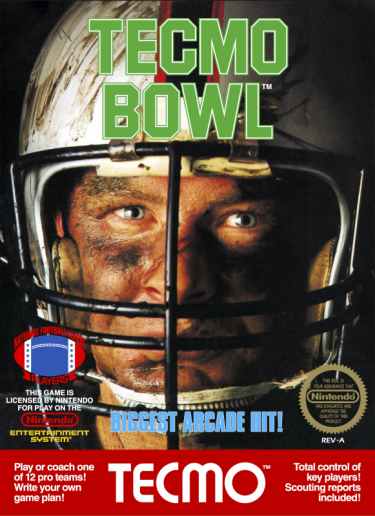 Though I dabbled with Atari in my nascent years, I was raised on Nintendo. I have so many fond memories of the console because I spent so much of my childhood with it. Don’t get me wrong: I think gaming today is just as good (if not better) than it was back then. But people enjoy reminiscing. I am no different.
Though I dabbled with Atari in my nascent years, I was raised on Nintendo. I have so many fond memories of the console because I spent so much of my childhood with it. Don’t get me wrong: I think gaming today is just as good (if not better) than it was back then. But people enjoy reminiscing. I am no different.
Allow me to indulge.
The year was 1988. Christmas was quickly approaching. My brother and I had heard really good things about this game called Tecmo Bowl, so we asked our mom to buy it for us. About a month before Christmas we spotted the first gift under the tree that was the size and shape of a game cartridge box. Being the busy woman that my mother was at the time, plus the fact that she had to track presents for six total children, my brother and I couldn’t help ourselves. So we prematurely unwrapped the present after school one afternoon without her noticing.
Sure enough, it was the much-anticipated and sought-after Tecmo Bowl, starring the untackle-able and greatest athlete of all-time, Bo Jackson. Of course, we started playing immediately. Once the first play session was over, we re-wrapped the gift and slide it back under the tree at night. Next day, rinse and repeat. Pretty soon we started inviting friends over to play as we were the first ones on the block to get the game. By the end we were so brazen, we didn’t even care when my mother approached our room, opened the door to see a group of boys playing “some video game,” and just assumed it was a title we already owned.
On Christmas day, my none-the-wiser mother handed me and my brother a tattered, repeatedly-tapped, re-wrapped present, and with a sweet smile asked which of us wanted to open it. It was no use. We had all grown tired of the game after playing it daily for a month straight. I hope our feigned faces still had enough smile on them to show our appreciation for the great gift it was and will forever be.
Thanks, Mom!
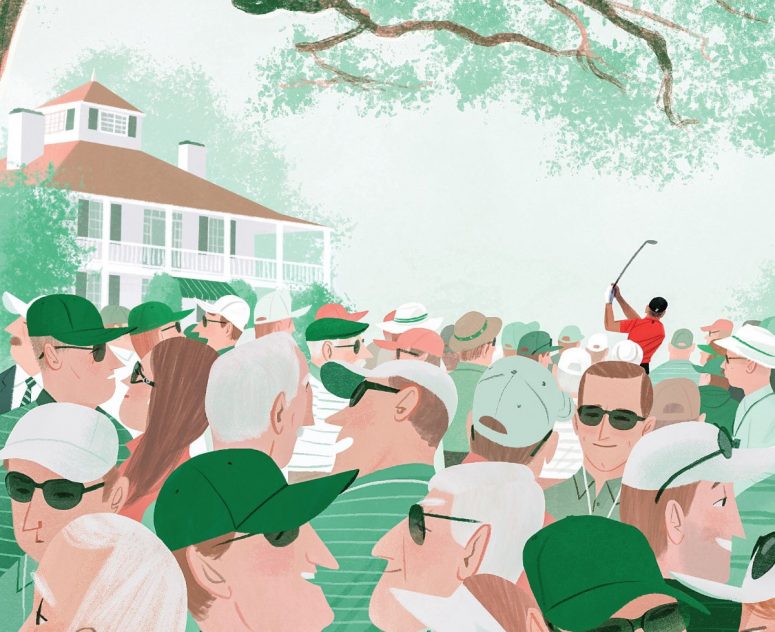
Please enjoy:
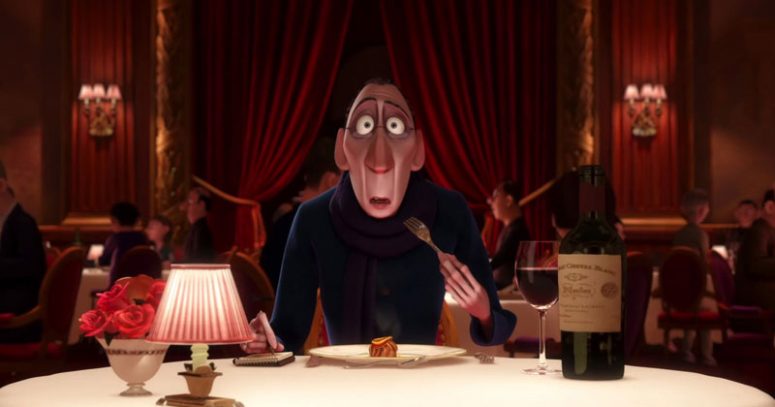
Courtesy Disney/Pixar
Many years ago, Disney released a Pixar film that had a profound impact on the course of my professional life.
At the time I was a full-time video game critic for several online magazines. I had a knack for raking mediocre games and announcements over the coals. I gained a reputation for publishing smart but scathing copy. Back then, I felt it was my job, if not duty, to critique everything I touched as if the orbit of the Earth depended on it. Continue reading…

Shutterstock
After Sears filed for bankruptcy (and likely its ultimate demise) last month, a part of my childhood died with it.
Long before I was born, Sears served as America’s first Amazon, allowing the entire country (especially rural parts of it) to mail order just about anything from a fat catalog. They didn’t offer two day shipping, but they delivered at a time when no one else did. Continue reading…

Derek Buck in 2015 overlooking the Great Smoky Mountains of Tennessee
I’ve never stayed in bed all day. At least not for mental reasons.
Thanks to the optimistic and high-energy genes I was gifted at birth, not to mention some healthy lifestyle habits (regular exercise/activity, balanced diet, lots of sleep, an appetite for reading, and scheduled relationship time), I’ve never felt depressed for more than a few hours at most.
So it’s difficult for me to relate and empathize with those who struggle with depression. I’m not saying that depression is invented. Not at all. But I am saying that it’s difficult for me to identify with or understand depression because I’m wired so differently.
My friend Derek Buck, on the other hand, knows depression all too well. I’m not sure if he’s up to his knees or up to his neck at the moment, but his excellent writing on the subject has increased my sympathy. Continue reading…
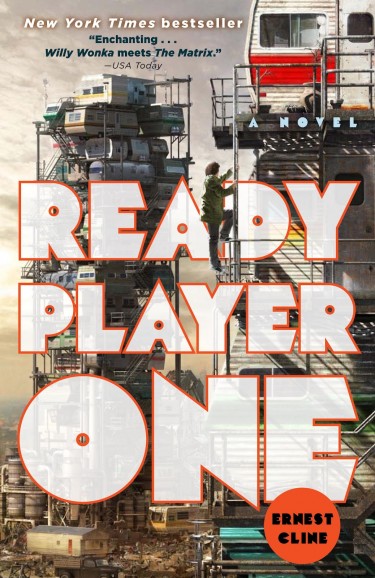
What might happen if humans lived an entirely simulated life, doing everything online except for eating and sleeping?
Earnest Cline has a dystopian, geeky, and fist-pumping answer in Ready Player One, his best-selling novel which I read over the holidays.
The story takes place in 2044 and follows a teenage prodigy named Wade as he seeks hidden fame, power, and fortune bequeathed by the world’s richest man. “But when Wade stumbles upon the first clue,” reads the synopsis, “he is beset by rivals that will kill for the prize, forcing him to confront the real world he’s always been so desperate to escape.”
Clever, huh? USA Today accurately described it as “Willy Wonka meets The Matrix.” I’d add a little Brave New World, ’80s game geek culture, Tron, and “The Wreck-It-Ralph of books” for good measure—all good things.
For fellow nerds who appreciate those things, I award the book a tilted four and a half out of five stars. For everyone else, particularly those who share my desire to curb compulsion disorders, I give it four stars.
These were my favorite passages: Continue reading…

credit: dungeons and dragons
Growing old is a weird as you imagined it. Not that any young readers ever think about getting old. As a tenderfoot, I certainly didn’t. Yolo!
In any case, onset aging baffles me. The body can’t move like it used to. The brain increasingly forgets things. And it’s perplexing to watch younger generations do things in ways you and your contemporaries can’t relate.
Take Let’s Play videos, for instance—one of the most popular and fastest growing types of television. Also called playthroughs, they work like this: Continue reading…
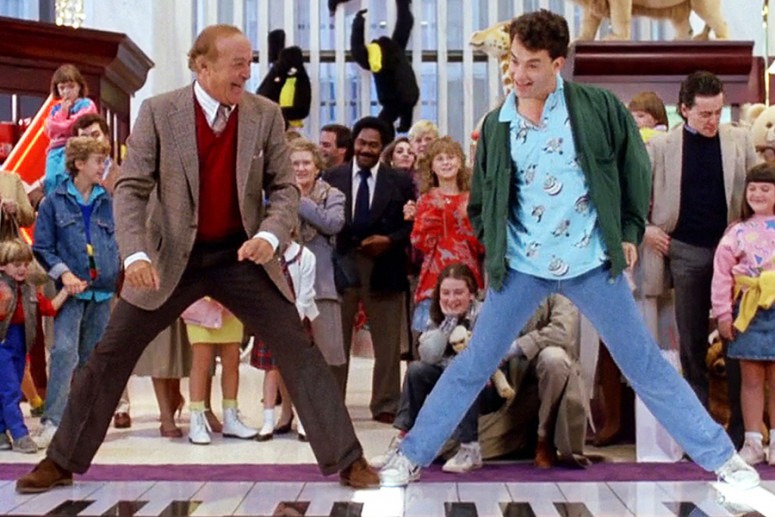
Twentieth Century Fox
When I was nine years old, I saw Big starring Tom Hanks. It’s a movie about a boy doing young-at-heart things in a grown-up’s body. That and being employed to have an opinion on (i.e. review) toys.
At the time, I thought it was the coolest movie ever made. I still think it’s pretty darn cool.
In reality, my work as a writer over the last decade is not unlike protagonist Josh Baskin’s. I get paid to have an opinion and ask a bunch of questions. I tinker with ideas, learn from those who are smarter than me, and slay the dragon of misinformation with research as my shield and a keyboard as my sword. Continue reading…

Photo: Lindsey Snow
I get paid to publish online stories. I love my job. But the harsh reality is my contributions cease to exist in the absence of power. Save for only a few printed artifacts, I don’t keep hardcopies of the hundreds of feature stories and thousands of blog posts I’ve written over the last decade.
I was humbled by that realization earlier this spring. The first two publications that ever paid me to write—Engadget’s gaming blog (Joystiq) and GigaOM—both shuttered within 30 days of each other. Their closures reminded me how impermanent life (and work) is. For now, my archives live on (here and here), but there’s no guarantee they’ll remain. They’ll be totally wiped out in a post-apocalyptic world like Mad Max: Fury Road (which you should run, not walk, to see right now).
Admittedly, I don’t sell life-altering work. I mostly help tech companies and media publications sell more widgets (i.e. products, services, or advertising) with believable stories that interest wide audiences. In any case, grasping your own insignificance is never easy. Big wheel keep on turning…
[youtube]https://www.youtube.com/watch?v=_MT_msVoRAg[/youtube]
My wife and I watched Atari: Game Over last night on YouTube (part II here). It’s an hour long documentary about the fast rise and even faster demise of video games in the early ’80s and the misinformation surrounding their fall (the games, not the decade).
That’s just the pretext, however. The documentary is really about hurtful group think, toxic urban legends, and the unfair, if not tragic, treatment of Howard Warshaw, a talented and pioneering game designer that was ostracized for his largely innocent role.
Although the documentary handles some weighty baggage, director Zak Penn keeps it fun, fast-paced, and peppered with likable characters. When Warshaw is partially redeemed by the end of the movie, I was rattled with sympathy.
Atari: Game Over isn’t as fist-pumping fun as Kong of Kong, which you should watch posthaste if you haven’t already. But the former is more accurate and just as endearing. Furthermore, it challenges the viewer to scrutinize their beliefs before accepting them and encourages us to give others the benefit of the doubt.
Five stars out of five.
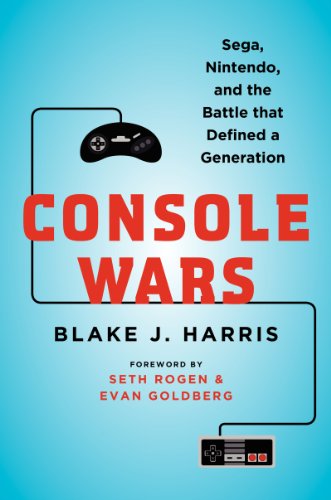 For any male readers born from the mid ’70s to early ’80s, listen up—Console Wars by Blake Harris has it all: your childhood, the answer to your next marketing challenge, cultural divides, innocence, under bellies, triumph, and loss.
For any male readers born from the mid ’70s to early ’80s, listen up—Console Wars by Blake Harris has it all: your childhood, the answer to your next marketing challenge, cultural divides, innocence, under bellies, triumph, and loss.
It’s also the only book I’ve ever read that made me feel as young as I am old. Take these gems, for example:
- “There was no such thing as a magic touch, and it wouldn’t have mattered if there were, because the only thing it takes to sell toys, vitamins, magazines (or anything) is the power of story. That was the secret. That was the whole trick: to recognize that the world is nothing but chaos, and the only thing holding it (and us) together are stories… When you tell memorable, universal, intricate, and heartbreaking stories, anything is possible.”
- “Tony Harman was prepared to leave with his tail between his legs (smiling, though, as his thesis that western cultures can make great games too had made it all the way to the top), but he decided to try one more approach. “Let me just ask one more question,” he said, taking a step toward [Nintendo President] Yamauchi. “How many bad television commercials do we make each year?” Continue reading…
 Reporting for CNN
Reporting for CNN
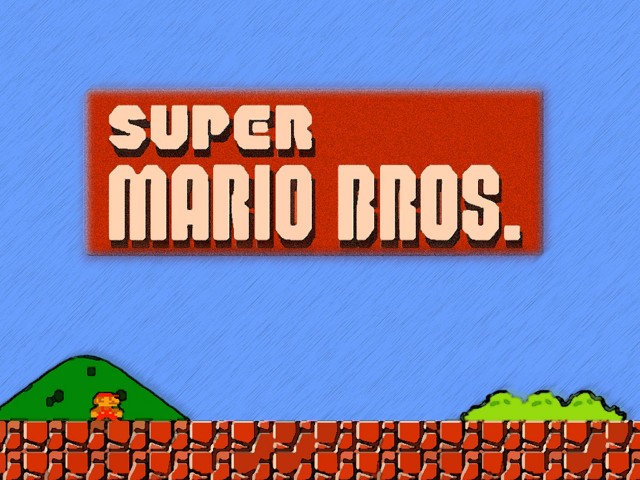
Getting an exact date, even for something as recently as 25 years ago, is hard to do, reports Frank Cifaldi. Not only do the victors get to write history, they often do it with faulty memories.
That said, I gotta think that remembering history is a lot more exact depending on the significance of the event — say remembering when a first shot was fired compared to the unassuming release of an iconic video game.
Still, humanity is lousy about keeping records. I’m no different.
 Recent things I’ve written:
Recent things I’ve written:
[youtube]http://www.youtube.com/watch?v=dJuyv_ckh98&hd=1[/youtube]
It’s not really Indiana Jones, but it rips it off beautifully. And you can play it.
Here’s why: 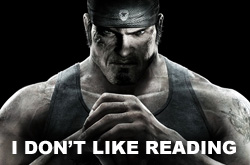
“I don’t read novels. I’m a novelist, but I don’t read. I don’t like reading. I love comics. I love reading comics. I can still read comics and write… But I come from a TV background.”—Gears of War 3 writer Karen Traviss, via Tom Chick
Nice to hear. For a while there I thought high-profile video games would start hiring writers who liked reading. Talk about dodging a bullet.
Notable feature stories I’ve written recently:
Similar to Madden NFL, the cable sports network now highlights the playmaker with a under-ring (as seen 1:05 into video). Me likey.

From one of the most brilliant minds of our time comes…
In the mid 2000s, live blogging was all the rage. Since streaming video was still in its infancy, a live blog was the only way you could get real-time updates of an event from a remote location. It was a great recourse, as onlookers could react, comment, and update each other in real-time.
Today, live blogging is mostly useless. Take this year’s E3, for example. Every game company either streamed their live press conference or had a partner do it for them, most of which could be embedded and streamed live to your own website or blog. Nevertheless, every major blog I came across continued to perpetuate the “live blog” like it was still an asset to the reader.
Unsurprisingly, comments have decreased on these live blogs because no one really cares anymore. The solution: Just slap a live video embed on your site and be done with it. You’ll still get all the reader participation you had before and cut down your workload.
<br /> <a href=”http://polldaddy.com/poll/5115412/” mce_href=”http://polldaddy.com/poll/5115412/”>In the next 5 years, what platform will you play the most video games on?</a><span style=”font-size:9px;” mce_style=”font-size:9px;”><a href=”http://polldaddy.com/features-surveys/” mce_href=”http://polldaddy.com/features-surveys/”>customer surveys</a></span><br />
Let me tell you.
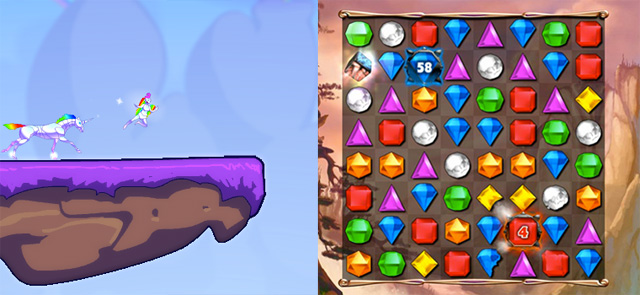 Robot Unicorn Attack and Bejeweled 3. I’m hooked.
Robot Unicorn Attack and Bejeweled 3. I’m hooked.

I’ve been playing with Kinect over the past few days, and I gotta say: It’s the most significant consumer product the company’s released since Windows 95. It’s not a home run—at least not yet. But it’s definitely a double stretching for a triple.
It’s also extraordinarily cool and brimming with promise. ![More...]() Continue reading…
Continue reading…
Used video games have been around since the early ’80s. But they weren’t a problem in the eyes of developers until the middle of the decade, at which point game sales weren’t growing as fast as they used to.
Rather than blame the safe creative bets, bloated budgets, and $10 HD surcharge (yes, many games carry an MSRP of $60 these days) for the decline, developers set their sites on used game sales. “When the game’s bought used we get cheated,” echoed one senior official this week, the latest in a long line of whining.
In light of complaints, some game makers are including single use “unlock codes” in factory sealed games, which they have every right to do. Dumb, but legal.
Still, imagine if other tangible goods started stripping features at resale. For example, “Unless you buy this house new, we’ll section off a part of the home behind a cement wall.” Or, “To see the end of this DVD, you’ll need to enter your single use unlock code.” Or, “Power steering won’t work in this car unless purchased new.”
Is that what game-makers are really after? Is that serving the customer and engendering them to your brand? Do video games really expect immunity from the resale of packaged goods, even though that’s the right they transfer to consumers when selling merchandise? Because if so, that’s incredibly backwards. Unrealistic. Hypocritical. Ignorant.
Obviously the industry is still run by insecure nerds.
… than watching this. Usually (I make exceptions for high-profile sporting events and the occasional Netflix stream.)
Point is, DVR lowers your standards. You wouldn’t watch half that crap (and by “crap,” I mean poorly produced, written, and acted shows when compared to movies) if it were live. So why subject yourself to lesser entertainment? I’m sure some people use DVR as it was designed: to make it easier to watch the shows you used to watch live. But the majority of DVR users actually abuse the technology, and end up watching more television (i.e. settling) than they normally would.
In that sense, DVR is not better living through technology. It’s clouding our judgment. It’s reducing our ability to think critically.
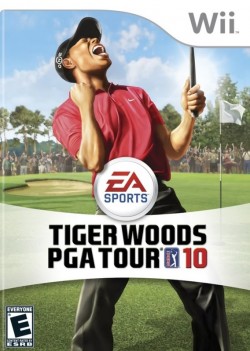 After Tiger Woods took “extramarital affairs” to new lows this year, numerous sponsors canceled their contracts with the once role model, including Gatorade, AT&T, General Motors, Accenture, Tag Heuer, and Gillette. Out of all his major sponsors, only two “stood by” his sleaziness, including Nike and Electronic Arts.
After Tiger Woods took “extramarital affairs” to new lows this year, numerous sponsors canceled their contracts with the once role model, including Gatorade, AT&T, General Motors, Accenture, Tag Heuer, and Gillette. Out of all his major sponsors, only two “stood by” his sleaziness, including Nike and Electronic Arts.
Today, the latter is wishing it hadn’t. Continue reading…
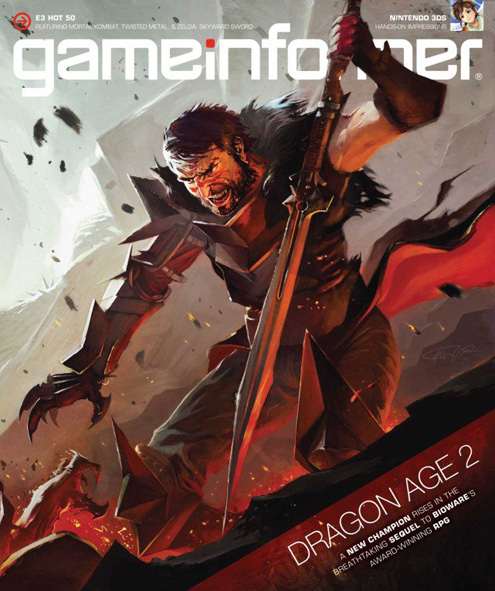
I have no idea.
By the looks of the cover, it seems this magazine is peddling comics, and not playable computer graphics, more commonly known as video games.
In other words, “concept art” is lame, and does absolutely nothing for me. Is it any wonder this medium is struggling?
From doctored screenshots to recorded animations, in-game graphics often underwhelm
 Left: Screen capture of a Madden 2005 trailer. Right: The final game, which looked noticeably worse.
Left: Screen capture of a Madden 2005 trailer. Right: The final game, which looked noticeably worse.
Video games are a delight. In my eyes, they’re better than television, and right up there with books, movies, sport, and music as pastimes. But since their beginning, games have held a dirty little secret: they never look as good as advertised. Here’s why: Continue reading…
Excluding blog posts and short-news articles:

It’s called Flight Control. You can download it on either iPhone or Nintendo DSi. And it’s awesome. My current high is 58.
Excluding blog posts and short news articles:
As with all things in life, video games are best when shared with others. But despite the medium’s rich history and current resurgence of multiplayer games, a tired stigma remains:
Video games are played in isolation, and thus perpetuate social retards.
“There is still this mindset that video games are lone wolf activities for like-minded groups of nerds,” says Troy Goodfellow, a freelance critic for nearly a decade. “But on the contrary, they build connections better than a lot of people think.”
Continue reading…
 Though I dabbled with Atari in my nascent years, I was raised on Nintendo. I have so many fond memories of the console because I spent so much of my childhood with it. Don’t get me wrong: I think gaming today is just as good (if not better) than it was back then. But people enjoy reminiscing. I am no different.
Though I dabbled with Atari in my nascent years, I was raised on Nintendo. I have so many fond memories of the console because I spent so much of my childhood with it. Don’t get me wrong: I think gaming today is just as good (if not better) than it was back then. But people enjoy reminiscing. I am no different.













 From one of the most brilliant minds of our time comes…
From one of the most brilliant minds of our time comes…

 After Tiger Woods took “extramarital affairs” to new lows this year, numerous sponsors canceled their contracts with the once role model, including
After Tiger Woods took “extramarital affairs” to new lows this year, numerous sponsors canceled their contracts with the once role model, including 
 Left: Screen capture of a Madden 2005 trailer. Right: The final game, which looked noticeably worse.
Left: Screen capture of a Madden 2005 trailer. Right: The final game, which looked noticeably worse.